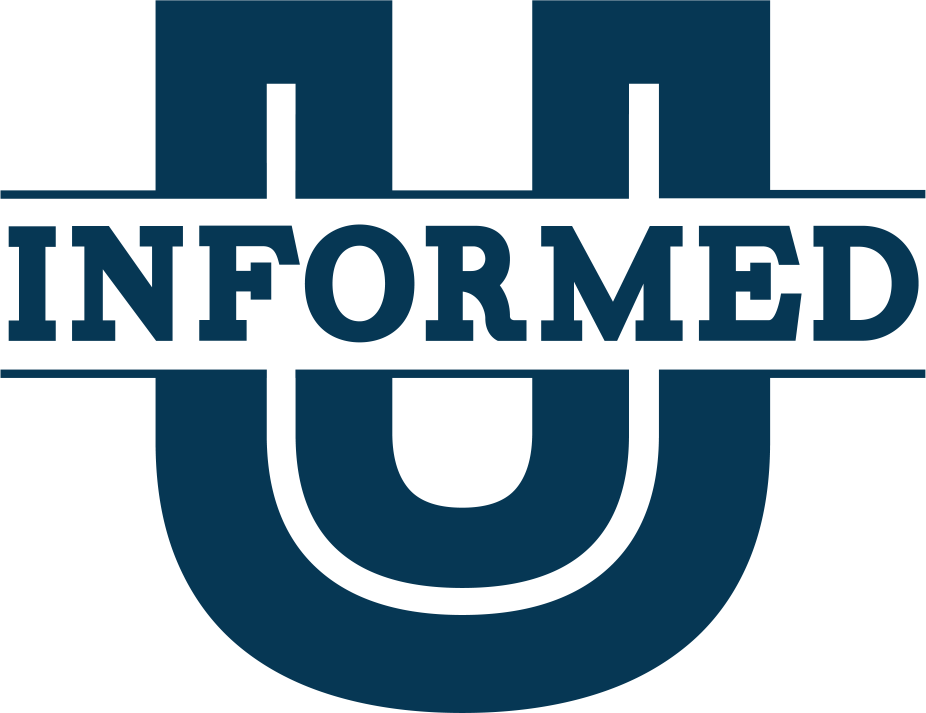PROGRAMS & TOOLS
PREVENTION
PROGRAMMING MATRIX
Informed-U: Standing Together Against Sexual Violence & Misconduct
This student-led program is based around small-group, discussion-based learning sessions. Informed-U trains cohorts of student facilitators to deliver the learning sessions to their peers, equipping them with learning tools, detailed implementation plans, and a host of support resources.
Website
http://www.informed-u.net/

| Program Name | Level of Evidence | Format | Target Audience | Special Features |
|---|---|---|---|---|
|
Informed-U: Standing Together Against Sexual Violence & Misconduct
|
Promising Direction |
|
|
Based in discussion and group work. |
Learning Objectives
The program challenges participants to:
- voice fears, concerns, and other feelings about sexual violence and misconduct on campus
- understand the scope of the problem of sexual violence and misconduct on campus and align around key terms and definitions
- analyze the concept of consent and develop actionable strategies around communication about consent
- understand the contributing risks factors (including alcohol consumption) associated with perpetration and victimization and develop actionable strategies around reducing them
- voice a commitment to being an active bystander; identify past and hypothetical situations where intervention was/could be employed; and develop actionable strategies for intervening in the future
- investigate both positive and negative social norms on campus related to sexual violence and misconduct; and develop actionable strategies for fostering/contributing to positive norms and combatting negative norms
- review and discuss campus resources available for reporting incidences, seeking help, and receiving support
- identify other programs/educational opportunities available on campus that address sexual violence and misconduct
- commit to actionable behavior changes that contribute to a safer campus community
Methods
The methodology is based on the belief that students should be the chief-change agents in improving their campus. The format gives participants the opportunity to interact face-to-face to examine important issues and collaborate on how to best make a positive impact. It brings students together in an open setting, sending a strong message that they are not alone in this and that their campus does not tolerate sexual violence.
Dosage
1 session, 1.5 - 2 hours long
Logistics
- The learning sessions are designed for groups of 6 to 8 students per table and they last approximately 2 hours. Generally, schools run multiple sessions simultaneously in a large ball-room or common area. A student facilitator manages the logistics and group dynamics at each table. It is recommended that a counselor is on site and available during sessions. (Facilitators are trained to refer students to campus resources in a discreet way should a participant need support.)
- Informed-U’s learning tools provide the structure for the sessions. The Facilitator Guide serves as instructions for the student facilitator and includes content-specific information as well as helpful cues and tips to help the facilitator manage group dynamics and logistics. The Session Script contains questions and statements that initiate discussions and activities. A 3’x5’ Map is placed on the center of a table and provides a visual framework for the session. The Card Activities add another layer of engagement and interaction to the experience.
- Informed-U trains student facilitators to deliver the program on their campuses, and provides a host of support resources in print and digital form. The student-led implementation model enables the program to reach the entire student body over the course of a year, even at large institutions, without burdening administrator There are many groups on campus that fit the role naturally (e.g., resident advisors, peer educators, and orientation group leaders).
Population Served
General college population, customizable for specific groups
Theoretical Basis For Approach
The curriculum is based on theories and evidence that support the efficacy of: bystander intervention, social norms, and the use of action plans. Support for learning methodology of the program comes from the self-efficacy theory, the theory of social learning, and the theory of active involvement. Additionally, the workshop is modeled after a successful diabetes education program that demonstrated significant improvements in participants’ blood glucose levels.
Program Effectiveness
The program launched in the fall of 2017. As of the fall of 2018, approximately 1,800 students across 4 campuses have gone through the program. Feedback from students and administrators has been very positive: 94% of students surveyed reporting that they would recommend their peers go through the program. As the program reaches more students, Informed-U will continue collecting self-reported data from participants and compiling longitudinal data related to incidence and reporting rates as well as knowledge and attitudes.
PARTICIPATING COLLEGES AND UNIVERSITIES
- Case Western Reserve University
- Bowling Green State University
- Moody Bible Institute
- University of Findlay
- Lourdes University
CONSIDERATIONS FOR ADMINIsTRATORS
This program is designed to help campuses bridge the gap between scalable and engaging programming in a time- and cost-effective manner. Basic customization to the learning tools is included in the cost of the program.
HOW TO ACCESS THIS PROGRAM
Campuses can contact Informed-U at info@informed-u.net. There is an annual license fee for access to the program and support resources, a fee for each in-person facilitator training (capped at 24 students per training), and a fee for each set of hard-copy learning tools. The more active the facilitator cohort is, the lower the cost of the program on a per participant basis.
